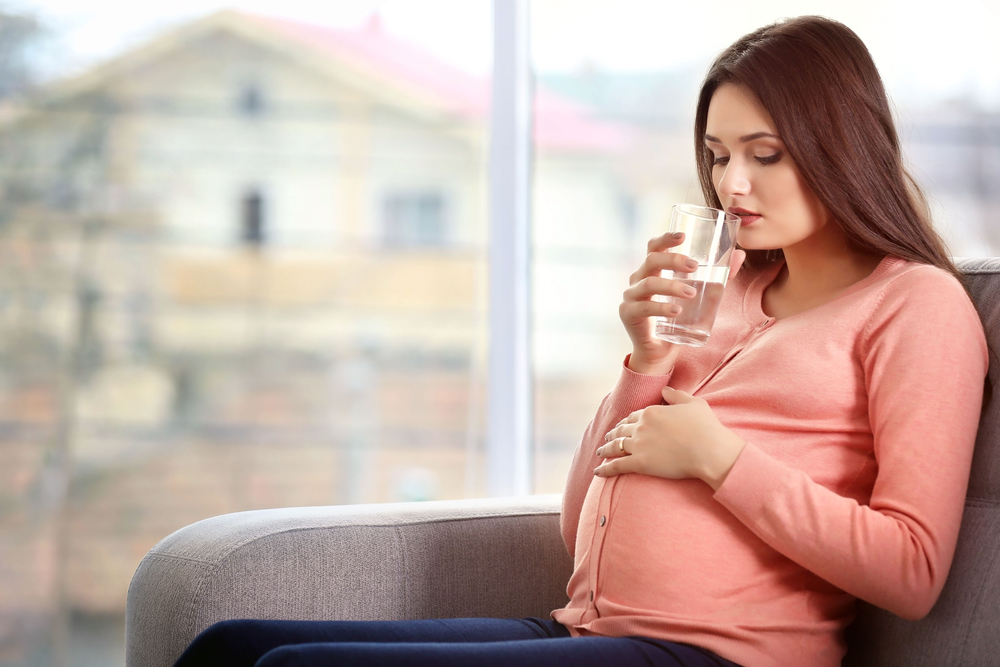Factors affecting a woman's nutrition during pregnancy
During pregnancy, any woman should pay attention to her diet. The condition of the baby depends on the weight of the expectant mother and the correct diet. Thanks to a competent approach to the choice of food, unpleasant complications and progression of pathological conditions can be avoided.
Pregnancy is the physiological state of a woman. She is preparing to become a mother and give birth to a healthy baby. To do this, she needs to eat right and spend more time in the fresh air. High-quality foods and fractional (up to 5-6 times a day) food intake contribute to a healthy pregnancy. And frequent walks help to get the right amount of oxygen and protect the child from hypoxia (oxygen starvation). And a pregnant woman needs moderate physical activity to train the ligamentous-muscular apparatus.
Influence of gestational age on dietary habits
It is important for a pregnant woman to consume a sufficient amount of protein foods.
A woman in an interesting position should receive all the necessary nutrients. It is important to remember that fats and carbohydrates are synthesized in the body, but proteins are not. This is why receiving is important. The main share of them falls on meat, fish and cottage cheese. And for comfortable digestion and proper bowel function, vegetable is needed. It enters our body in sufficient quantities with vegetables, fruits and herbs.
(up to the 20th week of gestation) a woman should eat well, because during this period, the laying and development of all organs and systems of the fetus takes place. The volume of food does not increase, portions should be small, and meals should be frequent. The diet needs to be varied and made complete. Among the main food products are the following:
- Meat or fish - 120–150 g / day;
- Milk or kefir - 200 ml / day;
- Cottage cheese - 50 g / day;
- Vegetables - 500 g / day;
- Fruits and berries - 200-500 g / day;
- Bread - 200 g / day.
(from 20th to 40th week of gestation) a woman's daily requirement for essential nutrients increases. First of all, this is due to the active growth of the child and the beginning of the work of his main systems (urinary, digestive, nervous). Also, the pregnant woman's need for vitamins (especially cholecalciferol -), minerals (,) and trace elements (, etc.) increases. Protein plays the main role during this period. Due to it, the diet of the pregnant woman is expanding. The most essential foods include:
- Meat or fish - 180-220 g / day;
- Cottage cheese - up to 150 g / day;
- Milk or kefir - up to 500 ml / day;
- Vegetables, fruits and berries - up to 1.5 kg / day;
- Bread - 200 g / day.
Pregnancy woman goes on maternity leave. The physical activity of the expectant mother is sharply reduced. This is due to the termination of work and the appearance of a lot of free time. A pregnant woman can rest, sleep and walk enough. At the same time, it is already difficult to be very active because of the large belly. And the approaching childbirth causes anxiety in the expectant mother. During this period (starting from the 32nd week), it is desirable to reduce the calorie content of the diet. The most important thing is to exclude from food products containing (confectionery, candy, jam, etc.). In this case, the protein must enter the body in sufficient quantities.
Intake rates of essential nutrients in the first half of pregnancy
Rates of intake of essential nutrients in the second half of pregnancy
Features of a woman's nutrition in pathology of pregnancy
 If a woman is tormented by vomiting, then in order to avoid dehydration of the body, she should consume a lot of clean water.
If a woman is tormented by vomiting, then in order to avoid dehydration of the body, she should consume a lot of clean water. Toxicosis is one of the most frequent complications of pregnancy up to 12-14 weeks. A woman suffers from periodic nausea, vomiting, increased sensitivity to odors, aversion to certain foods. In order for toxicosis not to turn into pathological weight loss due to a lack of appetite in a pregnant woman, it is necessary to correctly formulate a food intake.
Meals should be fractional (up to 5-6 times a day). Small portions are superimposed so that there is no overeating. Products should be selected with regard to food tolerance and increased sensitivity to odors during this period. Food should not be disgusting, unpleasant foods should be excluded for a while. The following should be present in the diet of a pregnant woman every day:
- Boiled meat (beef or veal, chicken) - 80-100 g;
- Cottage cheese - 50-100 g;
- Egg - 1 pc.;
- Kefir or milk - 200 ml;
- Fruit juice - 200 ml;
- Bread - 100 g.
If a woman suffers from periodic vomiting, then the volume of lost fluid should be replenished. To do this, you need to drink enough water (up to 1.5-2 liters per day). Also during this period, the intake of multivitamin complexes is important, since there are also losses of minerals. Among the frequently prescribed drugs are: "Mom's Health Alphabet", "Vitrum Prenatal", "Elevit Pronatal", "Pregnavit", etc. hospital.
The most common complication of the second half of pregnancy is preeclampsia (late toxicosis). It is manifested by high blood pressure, edema syndrome (edema in the area of the hands, feet), the appearance of protein in the urine. A woman should be under the strict supervision of specialists and, if necessary, be treated in a hospital.
During this period, it is important to limit salt intake and reduce drinking regime. The fluid retention in the body will be reduced and the swelling will gradually subside. In some cases, the appointment of diuretic herbs or fruit drinks is required. It is also desirable to reduce the amount of basic nutrients in comparison with physiological pregnancy: proteins - up to 50-60 g / day, fats - up to 40-60 g / day, carbohydrates - up to 200-300 g / day. Fasting days with the use of specialized therapeutic mixtures for pregnant women (Femilak, Dumil Mama plus, EnfaMama, etc.) and the exclusion of meat are very useful - 2-3 times a week.
Basic nutrient requirements of a pregnant woman (g / kg / day)
| Periods and features of the course of pregnancy | Protein | Fats | Carbohydrates |
| 1-5th month of pregnancy | 1,25 | 1,0 | 6,5 |
| 6-9th month of pregnancy | 1,25 | 1,0 | 6,5 |
| Obesity in a pregnant woman | 1,1 | 0,8 | 4,0 |
| Fetal hypotrophy (underweight) | 1,8 | 1,5 | 6,5 |
| Pathologically large weight gain in a pregnant woman (more than 300-350 g per week) | 1,5 | 0,8 | 5,5 |
| Edema, increased blood pressure, protein in the urine in the 2nd half of pregnancy (preeclampsia) | 1,0 | 0,8 | 4,0 |
| Eclampsia - late pregnancy toxicosis (sharp increase in blood pressure, seizures, loss of consciousness) | 0,7 | 0,5 | 4,0 |
| 1,8 | 1,5 | 6,0 |
The influence of an active lifestyle on the nutrition of a pregnant woman
 Pregnant women leading an active lifestyle should increase the calorie intake.
Pregnant women leading an active lifestyle should increase the calorie intake. If a woman in a position is physically active, continues to work, go in for sports under the supervision of an exercise therapy instructor, then she needs additional energy. It can be obtained from food. To do this, it is necessary to increase the calorie content of the diet.
If the pregnant woman leads an inactive lifestyle, does not work, is on bed rest due to the threat of interruption, then the calorie intake should be reduced. Thanks to this, it will be possible to avoid the unpleasant consequences of pregnancy (obesity, edema, pathological weight gain, etc.).
The influence of geographic conditions on the nutritional habits of a pregnant woman
When compiling a diet, it is important to remember the region of residence. In the southern regions, the calorie intake of food must be reduced by 5% by reducing and replacing it with carbohydrates. In high temperatures, excess fat can lead to obesity, but vegetables and fruits are essential.
In northern latitudes (Karelia), the calorie intake of food increases by 10-15%. At the same time, fat plays an important role for good thermoregulation and energy storage in cold conditions. It makes up 40% of the total daily ration, and proteins and carbohydrates account for 30% each.
Conclusion
Thus, every pregnant woman should clearly understand that during the period of bearing a child, there is no need to eat for two. From an excess of food, obesity develops or progresses not only in the expectant mother, but also in the fetus. A woman is gaining extra pounds, and with them additional problems (increased blood pressure, edema, the appearance of protein in the urine, the formation of diabetes mellitus, etc.). The baby becomes large (more than 4 kg), and as a result of this, natural childbirth can be dangerous for the mother. A planned or emergency caesarean section is prescribed. Yes, and the baby appears in the future.
For the normal course of pregnancy, it is important for a woman to follow the correct diet. Food should be healthy, meals should be frequent, and portions small. More attention should be paid to plant foods (vegetables, fruits, herbs) and animals with a high protein content (dairy products, meat, fish). Highly digestible carbohydrates (baked goods, cakes, pastries, etc.) should be sharply limited or completely excluded from the diet. Such food is quickly absorbed by the intestines and stored in the body in the form of fatty deposits.
Water also plays an important role for the expectant mother. A pregnant woman's body should receive liquid (still water, juices, tea, soups, broths, etc.) in the volume that is required to quench thirst or hunger. That is, no more and no less, but as much as you want.
During pregnancy with complications, it is important to closely follow the recommendations of specialists. If necessary, then change the diet in terms of the composition of the main nutrients and reduce the amount of water and drinking.
And the most important thing for any expectant mother is a positive attitude towards a successful outcome and support from relatives and friends. You need to walk more in the fresh air and eat on time. Then everything will be fine!
Here is what kind of food, according to Elena Malysheva, mothers-to-be should pay attention to:
 How to have the perfect date when you're not romantic
How to have the perfect date when you're not romantic What diseases do you need to drink coffee - benefits and effects
What diseases do you need to drink coffee - benefits and effects All my brown eyeliners
All my brown eyeliners